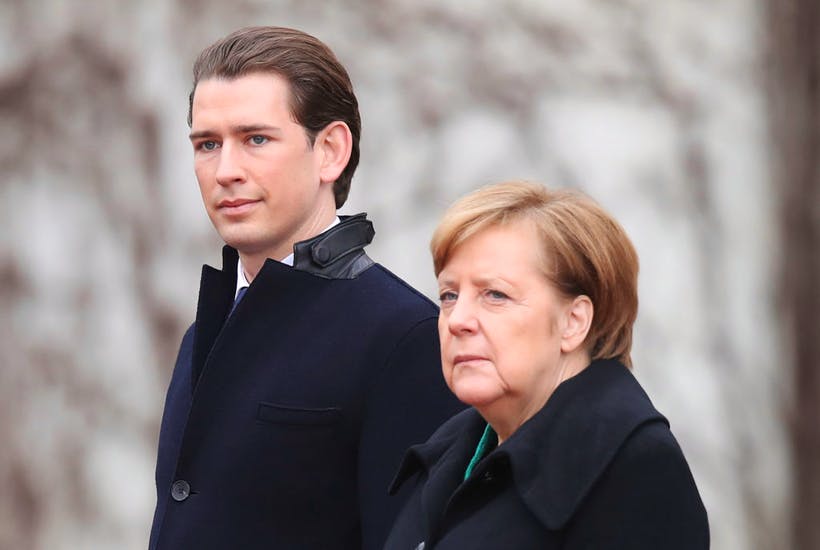Austria assumes the Presidency of the Council of the European Union this Sunday, and normally the response among rightminded Britons would be a resounding ‘Who Cares?’ Even before we voted Leave, this rotating six month stint was generally regarded with indifference. Now we’re on our way out, why should we be bothered whose turn it is in the EU chair? Well, the big difference this time around is that Austrian Chancellor Sebastian Kurz is rapidly emerging as Europe’s most influential politician. And for the EU, his spell in the hot seat could hardly have come at a more crucial time.
Like Trump’s America and Brexit Britain, Europe is divided. In Europe the great divide is between Western centrists and Eastern populists, and their differing responses to mass immigration. Visegrad nations like Poland and Hungary want tighter domestic borders. Centrists like Macron and Merkel prefer pan-European solutions. Italy’s new government has tilted the balance of power towards the populists. In this fractured landscape, Kurz is a rarity. He understands both points of view. He can reach out to both sides.
Kurz’s priorities for Austria’s Presidency are security and stability. That’s no surprise – what politician in their right mind doesn’t want such things? However this is more than just another empty ‘strong and stable’ catchphrase. For Kurz, security means securing Europe’s external borders against illegal immigration; stability means promoting EU membership for Austria’s Balkan neighbours. These diverse objectives show why he’s such an important politician. He’s determined to stem the tide of immigration, but he’s no Europhobe. He wants to bolster the EU, not undermine it.
The immigration crisis is causing political schisms all over Europe, and Germany’s is just the latest government to feel the strain. For Angela Merkel’s Christian Democrats, last week’s EU immigration summit was an attempt to heal a growing rift with their Bavarian sister party, the Christian Social Union, on whose support they rely to stay in power. CSU leader Horst Seehofer had advocated that migrants entering Germany who’ve already registered for asylum in other countries should be turned back at the German border – a stance which put him on a collision path with Merkel.
At last week’s summit, Kurz helped to find a way ahead which seemed to appease both factions. EU leaders agreed to create closed reception centres within the EU for newly arrived migrants, and new screening centres for prospective migrants beyond the EU’s borders. Italy’s new populist Prime Minister, Giuseppe Conte, said he was satisfied.
This stich and mend solution has bought Merkel a bit of time, but to survive beyond the summer she needs to follow through. In October, Bavarians go to the polls and Seehofer’s CSU is under intense pressure from Germany’s new anti-immigration party, Alternative für Deutschland. He needs to reassure his core supporters, and assuage their fears about immigration, or risk a battering by AfD.
‘This summit is not a breakthrough, just a step towards a new asylum policy,’ said Christian Lindner, leader of Germany’s Free Democrats. But at least it’s a step in the right direction, and it’s the sort of step that Kurz has been advocating for some time. ‘We’ve long since been calling for these protection areas, safe zones, landing centres, or whatever you want to call them,’ he said. ‘This idea has now prevailed.’ It’s prevailed because Kurz can build bridges between centrists and populists – between East and West.
What gives Kurz this ability to bring these opposing attitudes together? It’s partly a matter of history, and geography. To the east, Austria has land borders with the populist strongholds of Hungary, Slovakia, Slovenia and the Czech Republic – all part of the Austrian empire a hundred years ago. To the west, it has a long land border – and a common currency – with Germany (specifically, Bavaria), its cultural and linguistic hinterland. Vienna is the world’s second biggest German speaking city, after Berlin.
These Volkish connections are important, but there’s more to it than that. What makes Kurz so interesting is that he defies conventional stereotypes. You can’t pigeonhole him as a centrist or a populist. In fact, he’s a bit of both. Journalists focus on his extreme youth (Foreign Secretary at 27; Chancellor at 31) but that’s actually the least remarkable thing about him. He made his name as Integration Secretary (a new governmental post) with policies that were both tough and tender – bans on foreign funding for Austrian mosques, coupled with free German lessons for Austrian Imans.
When Kurz won last year’s national election, he faced a fork in the road. Under Austria’s proportional representational system, the government is nearly always a coalition. This time, the conventional solution would have been a coalition between Kurz’s centre-right People’s Party and the Social Democrats, who came second. Instead, Kurz formed a controversial coalition with Austria’s hard-right Freedom Party, who’d come a close third.
It’s been a bold and daring strategy, and not without its risks, but so far the responsibilities of government seem to have constrained the Freedom Party and brought the populists onside. Can a similar policy work for Europe as a whole? Europe has no shortage of centrists or populists. What it needs is pragmatists like Kurz, who can find the common ground.
Austria’s six months in the EU Presidency is exactly what the EU needs. Will the EU deliver on its promises and tighten up on immigration? Who knows, but right now the Austrian Chancellor is Europe’s best hope for turning fine words into decisive actions. For better or worse, the last decade of EU politics has been driven by Angela Merkel. It may be that the next ten years will be driven not so much by Emmanuel Macron, but by Sebastian Kurz.






Comments